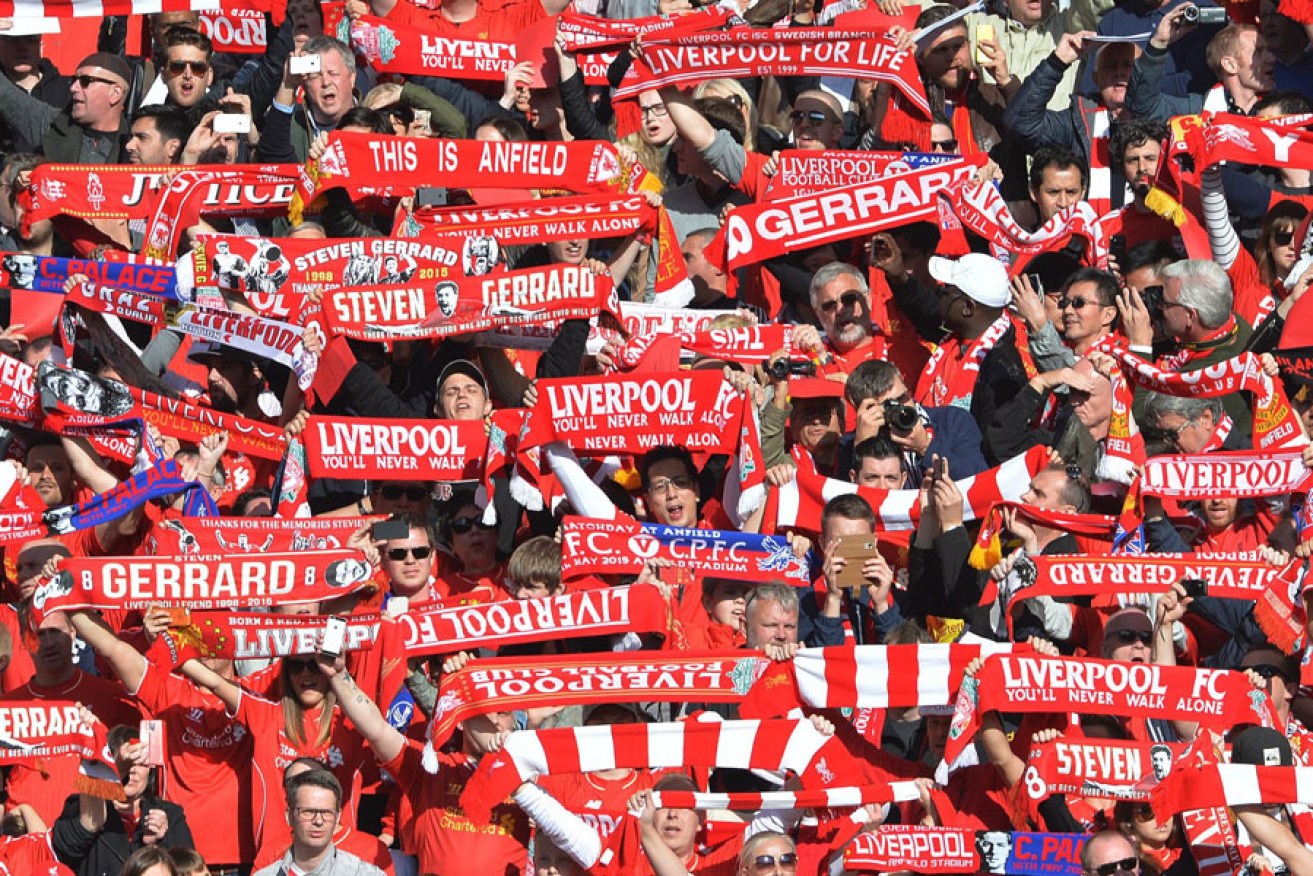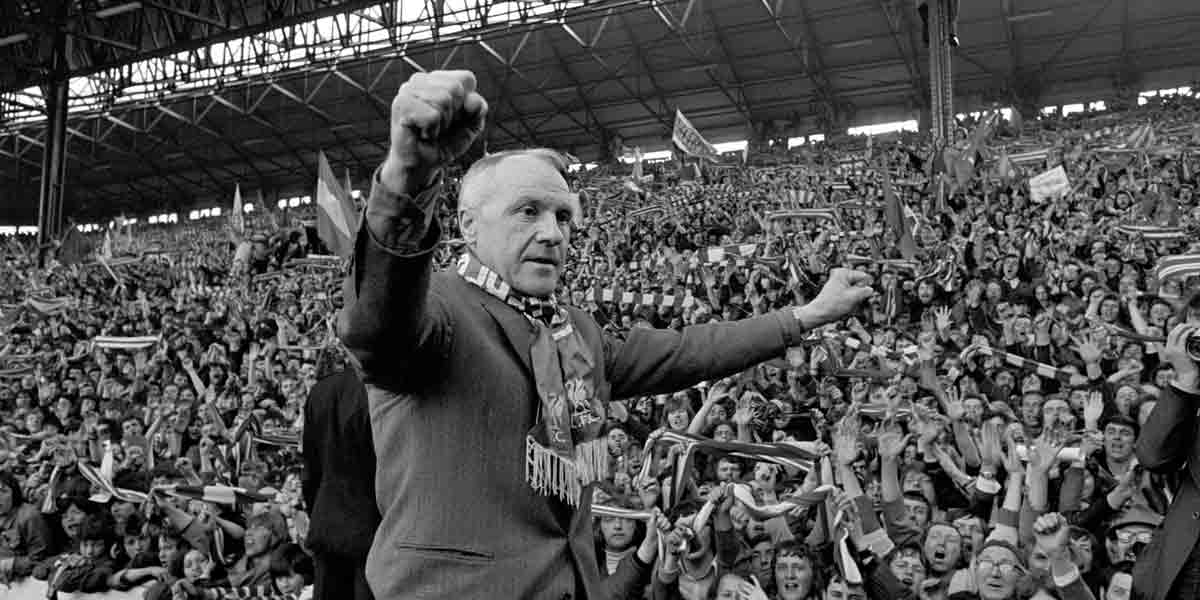Liverpool’s enduring popularity

Liverpool fans at Anfield for captain Steven Gerrard's final home appearance in April. EPA image
The strangest thing happened last year on April 13.
Liverpool Football Club was hosting league leader Manchester City and a win for the home team would keep its English Premiership hopes alive. And… I found myself wanting Liverpool to win.
In more than 30 years following the game, I could count how many times that had happened.
Unless Liverpool’s reds were playing teams I disliked even more (say Manchester United or Derby County), I’d want them to lose. They were the overdogs of my youth; the club which, in the words of its famous former manager Bill Shankly, “exists to win trophies”.
Shankly was at the helm when Liverpool began its most successful era, having lifted the club out of the second division.
But coming in to his second-last season in charge, 1972-73, Liverpool hadn’t collected any more trophies than Arsenal, Aston Villa, Manchester United or local rivals Everton. In the late sixties and early seventies, Liverpool usually finished below Leeds United.
That 1972-73 campaign saw Shankly’s team win both the League Championship and the UEFA Cup, the club’s first European success. In the 18 years that followed, Liverpool would win another 10 titles and finish in second place seven times. On top of that, there were cup triumphs in both England and Europe. Trophyless seasons were failures.
Liverpool’s supremacy coincided with the worst of the city’s post-war economic decline.
Many of us tend to think of the eighties as the most grim and desperate period in recent British history. Liverpool’s population decreased much more dramatically in the seventies with the closure of factories, businesses and, most symbolically, docks.
It’s tempting to explore the inverse relationship between the fortunes of the city and the fortunes of its clubs (Everton remained one of the country’s best teams) but it’s little more than coincidence. Most of Britain’s industrial cities declined in those years and in many cases the local teams did too.
What is certain is that many of the supporters enjoying Liverpool’s triumphs were also among the people most deeply affected by the city’s economic collapse. Before soccer’s gentrification began in the 1990s, few middle class Brits would admit to being fans.
[When I first visited England in 1994, a supporter might wear his or her favourite team’s scarf to matches but would rarely wear the team’s shirt in public. As a few fans explained, that identified you as a working class person. These days you half expect soccer shirts to be modelled on catwalks.]
Though it still has some of England’s most deprived communities, including the district of Anfield where Liverpool’s stadium is located, the last 25 years have been kinder to the city.
They’ve been less kind to Liverpool Football Club which hasn’t been able to win a league title since 1990.
Most fans would be happy if their teams failed like Liverpool has since then: winning seven major English trophies, the Europa League and, in 2005, the biggest prize in club football – the UEFA Champions League.
Nevertheless, as Bill Shankly once said, winning the (English) league is the club’s “bread and butter”.
Many of us who remember when Liverpool had enough bread and butter to alarm a dietitian still think of the teams of that era when we think of the club. How we hated their dominance.
Yet looking back now, there were things about those times that I miss.
I don’t miss antiquated stadiums, how fans were stereotyped and having little television coverage.
And I welcome the sport’s increasing wealth and popularity but these things also have their downsides, such as the way they’re making the game more expensive for traditional fans.
Which brings me back to why I wanted Liverpool to beat Manchester City last year. City was once an underdog, always finding ways of snatching defeat from the jaws of victory and forever in the shadow of Manchester United.
But the Abu Dhabi United Group, which took over Manchester City in 2008, has spent more than £1 billion trying to turn the club into the new power of world football.
After a last minute goal meant that City won the 2011-12 Premier League at Manchester United’s expense we all laughed (particularly when United fans moaned about City buying the title – no irony there).
Two years later, however, Liverpool was a genuine outsider in its (ultimately unsuccessful) battle for the championship with Manchester City.
Perhaps Liverpool’s massive global fan base seems more authentic now as well. Those without Scouser heritage who were drawn to the club because of its fame have stayed true throughout these relatively lean years.
I suspect many of the older fans, and perhaps some younger ones, really wish they could be watching the teams of those glory days play at Adelaide Oval next week. The reality of then included club favourites such as Kenny Dalglish, Craig Johnston and Ian Rush. The reality of now includes a 20 year-old leaving Liverpool despite being offered £100,000 a week. To go to Manchester City.
But those fans can rely on eleven players walking out to start the match for their team, a rendition of You’ll Never Walk Alone and enjoying the night with their community – thousands of people who may have little in common other than a passion for Liverpool Football Club.
That doesn’t guarantee we’ll see a great match at Adelaide Oval but it does ensure that it’ll be a great event.
Paul Marcuccitti is InDaily’s soccer columnist. He is a co-presenter of 5RTI’s Soccer on 531 program which can be heard from 11am on Saturdays.





